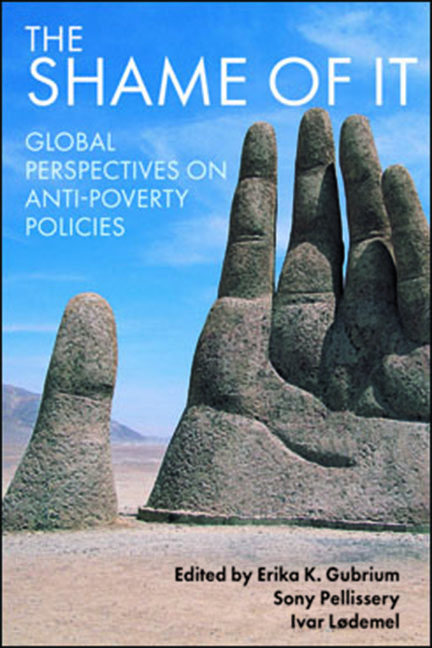Book contents
- Frontmatter
- Dedication
- Contents
- Notes on contributors
- Acknowledgements
- Preface
- one Resetting the stage
- two New urban poverty and new welfare provision: China’s dibao system
- three Thick poverty, thicker society and thin state: policy spaces for human dignity in India
- four Self-sufficiency, social assistance and the shaming of poverty in South Korea
- five ‘Not good enough’: social assistance and shaming in Norway
- six Pakistan: a journey of poverty-induced shame
- seven Separating the sheep from the goats: tackling poverty in Britain for over four centuries
- eight ‘Food that cannot be eaten’: the shame of Uganda’s anti-poverty policies
- nine Shame and shaming in policy processes
- ten Towards global principles for dignity-based anti-poverty policies
- Index
six - Pakistan: a journey of poverty-induced shame
Published online by Cambridge University Press: 03 February 2022
- Frontmatter
- Dedication
- Contents
- Notes on contributors
- Acknowledgements
- Preface
- one Resetting the stage
- two New urban poverty and new welfare provision: China’s dibao system
- three Thick poverty, thicker society and thin state: policy spaces for human dignity in India
- four Self-sufficiency, social assistance and the shaming of poverty in South Korea
- five ‘Not good enough’: social assistance and shaming in Norway
- six Pakistan: a journey of poverty-induced shame
- seven Separating the sheep from the goats: tackling poverty in Britain for over four centuries
- eight ‘Food that cannot be eaten’: the shame of Uganda’s anti-poverty policies
- nine Shame and shaming in policy processes
- ten Towards global principles for dignity-based anti-poverty policies
- Index
Summary
Introduction
A federal parliamentary republic of over 180 million people, Pakistan has the sixth largest population and 27th largest gross domestic product (GDP) purchasing power parity (PPP) in the world (IMF, 2012). However, its multidimensional poverty headcount stands at 49.4 per cent and it ranks 145th on the Human Development Index (OPHI, 2011; UN, 2011). Although the responsibility for policy theoretically rests with the Cabinet and individual ministers, because of a feeble and erratic democracy, it is often senior civil servants who assume the central roles in the conception, framing and delivery of policies.
This chapter begins by tracing the evolution of anti-poverty policy in Pakistan over the last 66 years to understand its role in the poverty–shame nexus. It then goes on to consider the specific psychosocial impact on beneficiaries of Pakistan's two largest ongoing cash assistance programmes, Zakat and the Benazir Income Support Programme (BISP). Research involving interviews with adults and children living in poverty and with those in economically stable positions, including nine parliamentarians (Choudhry, 2014a, 2014b, 2014c), largely supported a connection between poverty and shame (see Smith, 1776; Sen, 1983) and also suggested that shame may be largely influenced by relevant state policies. In order to investigate this finding more closely, an in-depth analysis of anti-poverty policies in Pakistan from the start of independence in 1947 until the present day was carried out. Within this time frame, a closer focus was reserved for the most recent five years, encompassing government policies introduced in the post-Musharraf era.
Historical framework: the evolution of inequality and the space for poverty-related shame
Historically, concepts such as dignity, pride and self-respect in Pakistan derive from collective religious, political and cultural traditions. Muslim minority rule over India for almost 800 years, for example, injected a certain communal pride among them that was instrumental in the demand for a separate homeland at the time of the British departure in 1947. M.A. Jinnah, the founding father of Pakistan, made a broadcast to the people of Australia on 19 February 1948 and described the collective identity of the nation in terms of ‘all equal in rights, dignity and self-respect’ (Dawn Archives, 2001). On the ground, however, the reality of being ‘equal’ was intricately rooted in a past that was hugely influenced, socially and economically, by political allegiances formed during the colonial era and by migration outcomes at the time of India's division.
- Type
- Chapter
- Information
- The Shame of ItGlobal Perspectives on Anti-Poverty Policies, pp. 111 - 132Publisher: Bristol University PressPrint publication year: 2013
- 1
- Cited by



